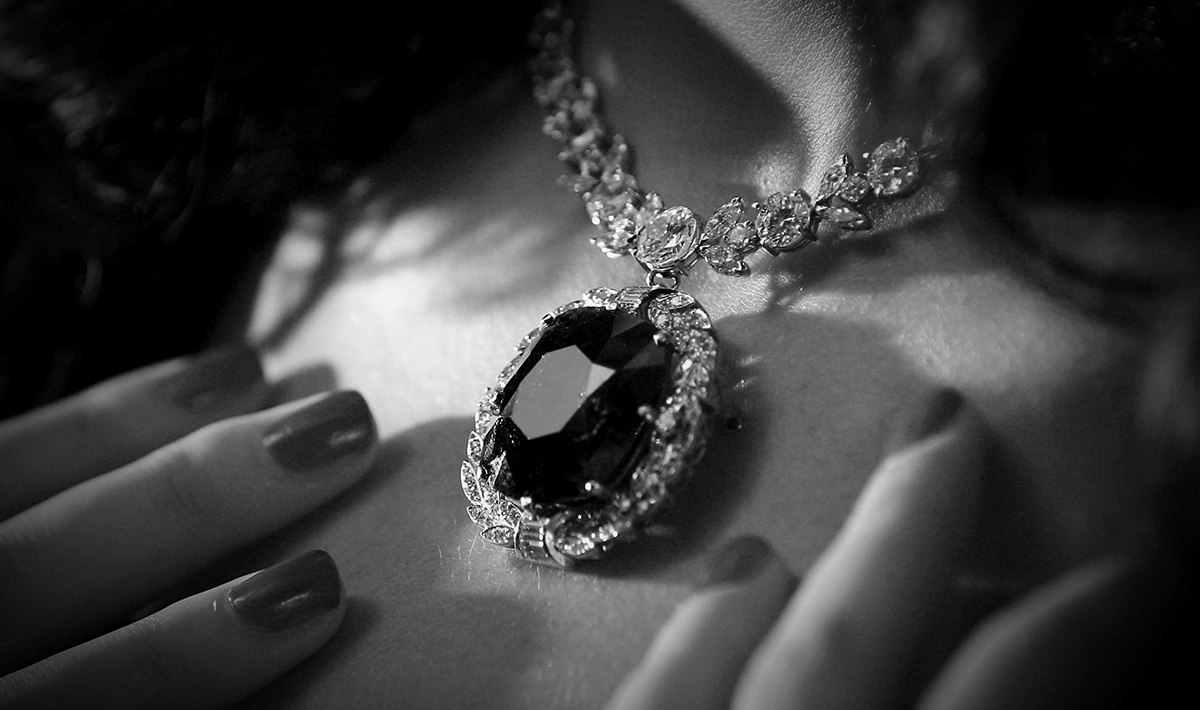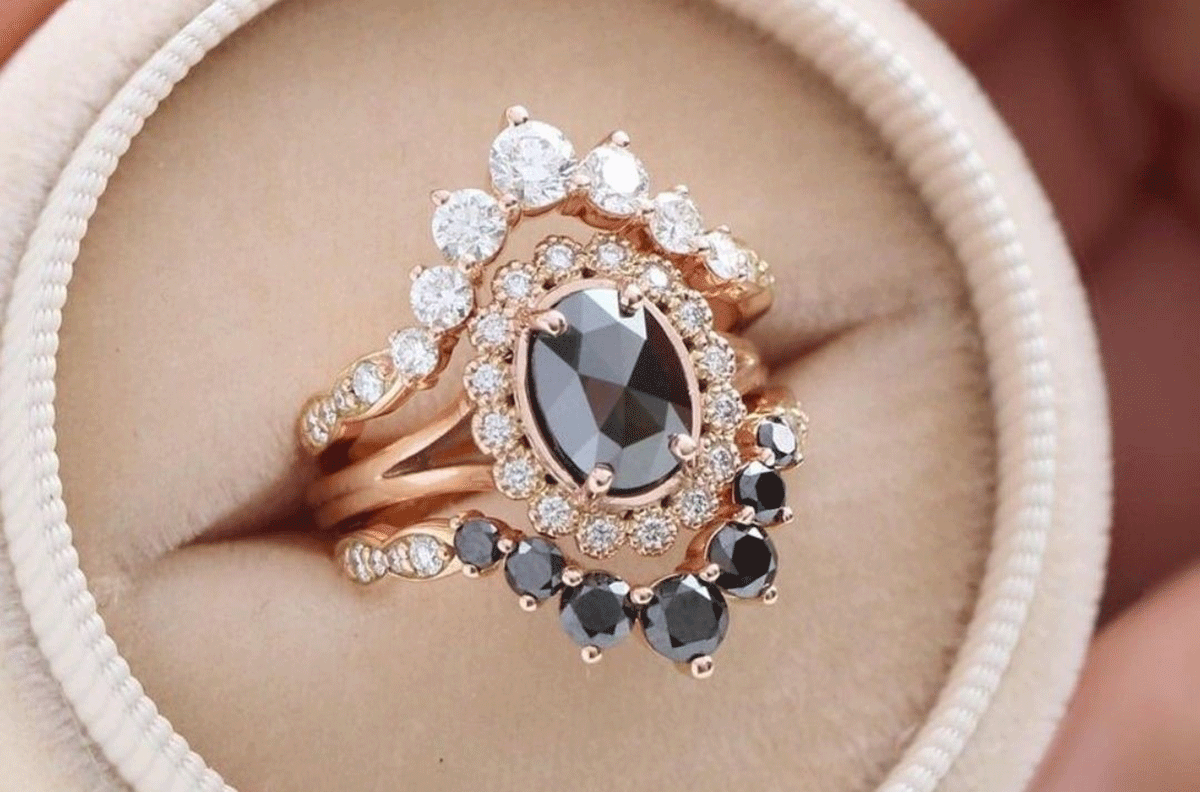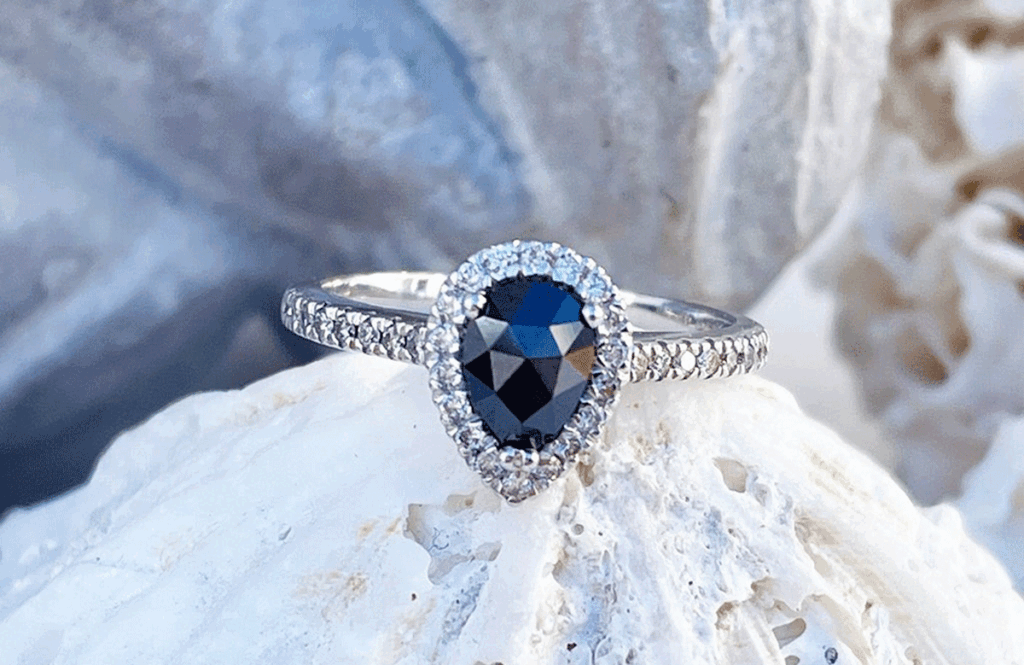Millennials are currently taking center stage in life. They are the generation that grew up in the Internet age. They are individualistic, and their idea of socialization is through social media using their mobile devices. They spurn the old school of thought and love to venture into grounds way off from their parents. They are fond of “making a statement” in everything they do, including their choice of jewelry.
Out of their quirkiness, an unexpected thing happened—the sharp uptick in the popularity of black diamonds and black diamond rings.
Black Diamond Ring
Before wading deeper into black diamond engagement rings or black diamond engagement rings, it would be worth knowing what a black diamond is.
Black diamonds are trendy—often appearing in photographs of celebrities. It is more affordable than colorless diamonds, appealing to budget-conscious buyers.
Its history is, however, murky. So, read more about this mysterious gemstone and why it is so in demand.

Black diamonds are diamonds with a very high number of inclusions. While inclusions in most colorless or colored diamonds are tiny sparks, black diamonds have an extremely high inclusion level, making them
appear completely black. According to GIA’s Robert Kammerling, “Their color is due to inclusions, and not lattice defects.”
Ironically, its high level of inclusion makes black diamonds a unique and rare kind of colored diamond. However, they differ from other fancy-colored diamonds, usually formed by chemical impurities during the stone’s formation. Black diamonds are more similar to white diamonds, except for their high level of inclusions.
Gemologists believe that the color of black diamonds is due to the high concentration of graphite. They differ slightly from other diamonds because their structure consists of many tiny crystals stuck together randomly, while regular diamonds are homogenous in structure.
While their hardness is also 10 on the Mohs scale, they are harder than most colorless diamonds. Before they were used in jewelry, they had important roles in various industrial applications.
Black Diamond History
The history of black diamonds is somewhat murky. What is known is that it was first discovered in Brazil in 1840 and called carbonado (an opaque, dark-colored, fine-grained aggregate of diamond particles valued for its superior toughness).
However, mining them for commercial and industrial purposes started in the early 1920s in the Central African Republic. Other theories abound regarding its real origins. According to scientists, black diamond defies many typical rules for minerals. While most diamonds are found in kimberlites, black diamonds are in younger rock formations called alluvial deposits.
Other theories abound regarding its origins. The most popular is that they resulted from asteroids that hit the Earth millions of years ago. When carbon was subjected to high pressure due to its impact, inclusions such as graphite, hematite, and pyrite were created.
Jewelers began using black diamonds in the 20th century. But its popularity increased only lately due to its affordability and appeal. Millennials find them attractive and different from the traditional.
Types of Black Diamonds
Natural and treated black diamonds
Natural black diamonds are very rare. Only one in 10,000 natural diamonds are colored; out of this very small amount, only a portion is black. And since its demand is high, science was brought in to pave the way for the entry of treated black diamonds.
Here’s the difference between the two:
Natural black diamonds get their color from mineral inclusions, while treated black diamonds are made black through a process that requires radiation or the application of high heat.
Often, treated black diamond starts as gray diamond. Then, it is subject to high heat and low pressure. The process changes the fractures within the stone, turning them black.
Famous Black Diamonds
Though the popularity of black diamonds and black diamond engagement rings is a 20th-century phenomenon, these stones have made headlines early on due to the discovery of amazingly large specimens. Here are three of them:
The Black Orlov
The Black Orlov is an amazingly fabled stone. It was originally an uncut 195-carat stone called the “Eye of Brahma,” set into an idol in Pondicherry, India, where a monk stole it.

From there, the story of its being cursed began to unfold when the monk who stole it was murdered. Then it resurfaced in Russia as a possession of Princess Nadioa Vyegin Orlov who renamed it the Black Orlov.
Nothing is known of it after that except for the mysterious suicides of those who came in contact with the Black Orlov – the suicide of a diamond dealer and two princesses.
Then, in the 1950s, Charles Windson purchased it and had it cut into three separate parts. Except for the 67.5 carats that Dennis Peimezas bought in the early 2000s, nobody knows the whereabouts of the other parts of the Black Orlov.
The Amsterdam Black Diamond
The Amsterdam black diamond is a pear-shaped diamond with a difference. While most pear shapes have 57 to 58 facets, this has 145.
It first appeared at D. Druker & Sons, an Amsterdam store that purchases rare rough diamonds from South Africa. Then, in 1972, D. Druker & Sons had it cut and polished by diamond experts, resulting in a 33.74-carat stone.
As a marketing ploy, it was released to the public during the 700th anniversary of Amsterdam’s cityhood. The city has always been a leader in the diamond industry until after the Second World War, and to mark that legacy, D. Druker & Sons called it the Amsterdam Black Diamond.
The Spirit of Grisogono
The Spirit of Grisogono was found in Central Africa. A mammoth of a black diamond, it weighed in at 587 carats. When it was discovered, jewelers from all over wanted to have the opportunity of cutting it. Eventually, the honor was given to Swiss jeweler De Grisogono.
Grisogono cut it into a large diamond weighing 312.24 carats. Then he set it into a white gold ring adorned with 702 smaller colorless diamonds. The ring, of course, is absurdly large. As a diamond, Grisogono remains the largest black diamond ever found.
Black Diamond Rings
As the world changes, so does the mindset of the young generation created by those changes. They prefer personalized and unique engagement and wedding rings. They want to experiment with various ideas to fit their worldviews.

While classic diamonds remain the timeless option, other gemstones are trying to gain a slice of the pie. Emeralds, sapphires, and other unique diamonds like black diamonds are providing serious competition to the everlasting colorless diamond.
Black diamond rings are currently popular as the ultimate choice in sophisticated glamour. They are unique, mysterious, and alluring. With their rich, deep color and dramatic look, black diamond rings are a fantastic choice for couples wanting to get engaged or for brides-to-be. It is currently the perfect expression of personal style or going against the flow.

How to Buy a Black Diamond Ring
If you are planning to buy a black diamond ring, may it be a black diamond mens ring, or for a woman, engagement, or wedding, here are some considerations to keep in mind to get the most out of your purchase.
Cut
has its appeal. To get the most out of its beauty, go for classic cut styles such as round, pear, or cushion.
Color

Setting
Cost
Cost is always important to consider when buying any kind of jewelry. Unfortunately, there is no standard answer. Like any other gem or ring, many things make up a jewelry’s price. These are the carat weight, setting, design complexity, marketing costs, and so on. So, how much is a black diamond ring? You can find a black diamond ring for as low as $2,500 or as high as you want it to be.
This means that you must first determine what you want and then work to form a budget for that.
While on the subject of cost, there is one thing you must consider to get your dollar’s worth. Natural or untreated diamonds are extremely rare and can only be found in Africa or Brazil.
However, sellers will try to convince you they only sell authentic black diamonds. It’s not uncommon for a seller to pass
off a moissanite as a black diamond. Black diamonds are made up of amorphous carbon and graphite and will often show soot-like clarity.
So, if you are unsure, have the diamond tested by the dealer or a professional diamond tester.
Caring for Your Black Diamond Rings
Caring for black diamond rings and other jewelry requires little effort. However, proper care will ensure the stone maintains its luster and sparkle.
Natural black diamonds are difficult to cut. As a result, they are often cut with less precision than other stones, resulting in microscopic but sharp edges. Hence, extreme care must be exercised in wearing it to avoid
damage or chipped-off edges.
Most of the treated black diamonds are extremely hard and durable and can take a punishment. Still, it’s best to take them off when you shower. Some lotions and soaps leave residues, which can make the stone look dull.
Clean your black diamond ring at least every two weeks. Cleaning is easy and simple. Just submerge it in a bowl of water with a few drops of dish soap. Let it soak for at least 5 mins. Then brush it with a soft-bristle brush. Rinse it right after putting it on a soft cloth and gently wipe it dry.
Black diamond rings are the ultimate in sophisticated glamour and fashion. They are highly unique, mysterious, and alluring. They are available in different depths of color and dramatic look. But they are not the only items of jewelry black diamonds have gained inroads into.
For more on black diamonds, read Why Black Diamonds Should Be In
Your Jewelry Collection.
